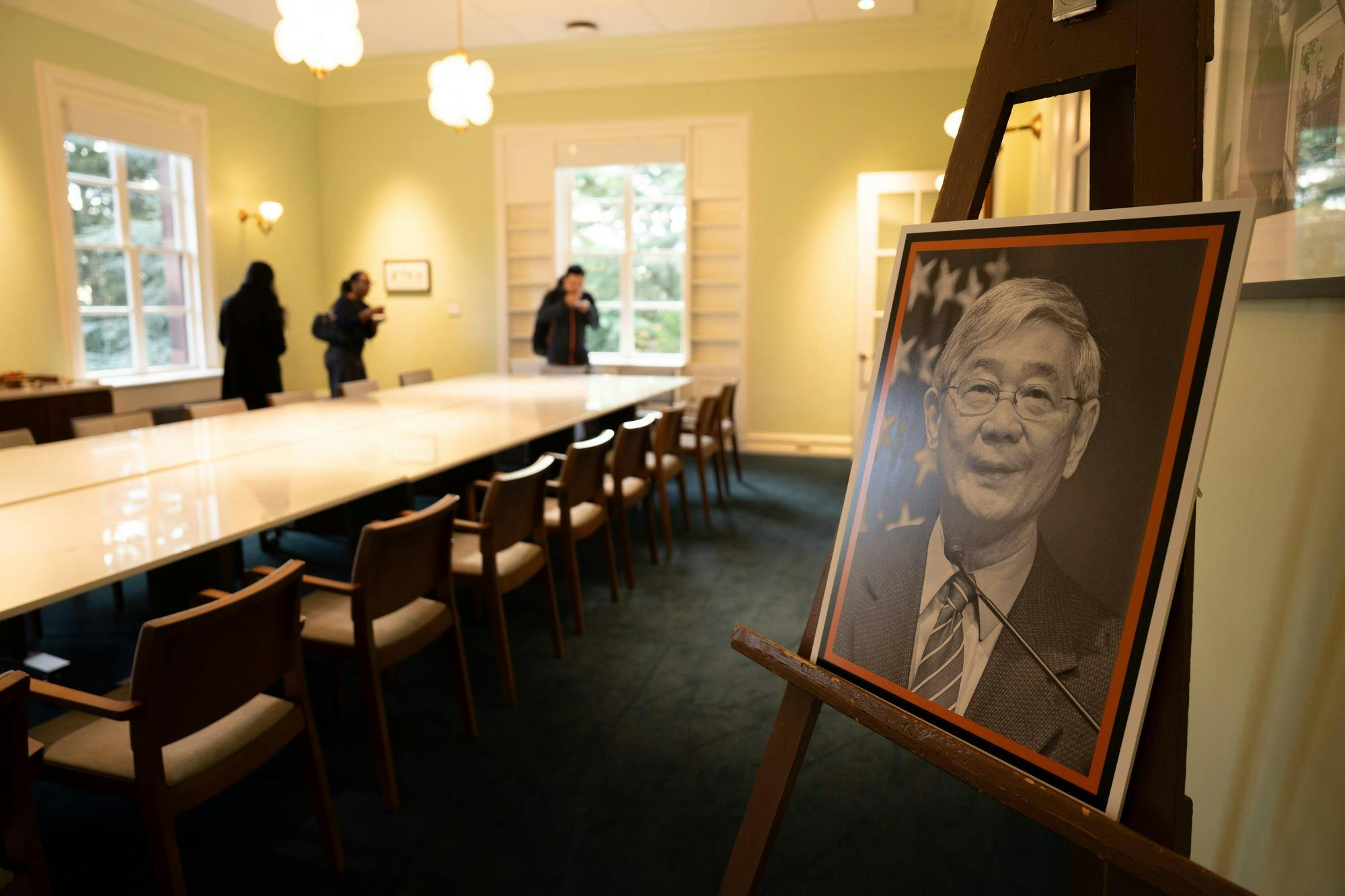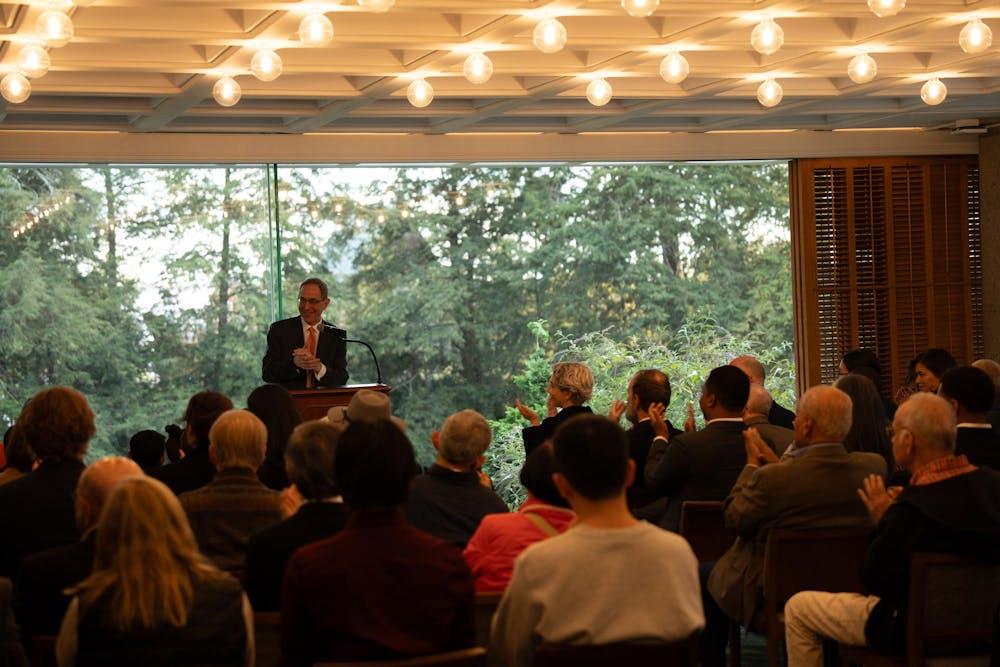On Wednesday afternoon, alumni, faculty, and administrators gathered in the newly named Alan Turing Garden Room to officially dedicate spaces in the renovated Prospect House to 12 distinguished honorees connected to Princeton University.
Among the honorees was Sally Frank ’80, the only living individual recognized, who attended the ceremony alongside the family members of several others.
The event marked the culmination of a multi-year effort by the Committee on Naming of the Council of the Princeton University Community, which began soliciting feedback from the Princeton community in 2023.
The new names, announced in May, recognize individuals with “exceptional levels of achievement and evident connection to Princeton,” Professor Beth Lew-Williams, who chaired the Committee during the process, said during the event’s opening remarks.
Lew-Williams emphasized the Committee’s efforts to consider individuals outside of the traditional understandings of what it means to have achievement and connection to Princeton.
“Part of what the committee was trying to do was figure out what both those things meant,” Lew-Williams said of the criteria in an interview with The Daily Princetonian. “We really thought it was important to try to think about all the other people that are part of our community,” Lew-Williams said.
Lew-Williams cited the naming of Laura Wooten Hall for a longtime Campus Dining worker who was also the longest-serving poll worker in the U.S. as well as several new honorees, including Katharine Fullerton Gerould, the wife of a faculty member and a prominent writer who was excluded from the University’s academic community, and Alexander Dumas Watkins, an African American instructor who never received a formal title, as examples of this broader approach.

The room dedicated to Alexander Dumas Watkins.
Calvin Grover / The Daily Princetonian

The dedication initiative was co-sponsored by the Office of Institutional Equity and Diversity. Vice Provost of Institutional Equity and Diversity Michele Minter highlighted the significance of recognizing a wider range of individuals whose legacies shaped Princeton’s present.
“Most of these individuals could not have envisioned the Princeton of today, with its diversity of people, academic disciplines, and opportunities,” she said. “And yet, their imagination and integrity has made us better. It is a privilege and obligation to lift up this history and all of Princeton’s history.”

A portrait of Franklin Odo ’61 GS 75 displayed inside a renovated meeting room at Princeton’s Prospect House.
Calvin Grover / The Daily Princetonian
University President Christopher Eisgruber ’83 echoed this sentiment in his remarks at the event, emphasizing that “many of the honorees persevered in the face of discrimination, including some experiences that, sadly, occurred on this campus.”

“By naming Prospect House dining areas, meeting rooms, and gathering spaces after these 12 exemplary individuals, the University continues its ongoing work to tell a more complex and more complete narrative of Princeton’s history,” he continued.
For Frank, being named alongside figures such as Alan Turing GS ’38 and John Nash GS ’50 was humbling.
“I just can’t stop smiling,” she told The Daily Princetonian in an interview. “When they said 12 people, I thought it was all going to be student activists. When I saw the list, I thought, how am I on the same list as Alan Turing and John Nash? It’s extra exciting, and I still don’t know how I’m on the same list with them.”
Frank, who fought a landmark legal battle for women to be allowed into Princeton’s all-male eating clubs as an undergraduate, was honored for her role as an activist for gender equity. In 1979, she filed a lawsuit against Cottage Club, Ivy Club, and Tiger Inn for excluding women from membership.
This legal battle over gender discrimination dragged on after her graduation, ending in 1992 when Frank won her lawsuit. Following her time at Princeton, Frank continued her advocacy work and is currently a professor at Drake Law School.
“I’m really, really pleased that the University is taking a lead on saying, no, we believe in diversity, equity, and inclusion … I’m very proud of the University and President Eisgruber for being out front with that,” Frank said.
Reflecting on her own experiences, Frank urged current students to take action when they encounter injustice: “If they see something wrong, work to change it. There’s the phrase: ‘You can’t fight city hall.’ Well, you can.”
University Architect Ronald McCoy GS ’80 described the restoration of Prospect House as “the most comprehensive reconstruction and restoration in the history of the house, essentially rebuilding Prospect House for the next 100 years.”
“To guide the design, we established three specific goals: to transform and enliven the house in ways that create a warm and welcoming environment … to resonate and intersect with the historic architecture… and make much-needed improvements to functionality and performance of the meeting rooms,” McCoy said. “This transformation is both subtle and thrilling.”
Oliver Wu is a News contributor for the ‘Prince.’ He is from Stony Brook, N.Y. and can be reached at oliver.wu[at]princeton.edu.
Toby Chang is a News contributor for the ‘Prince.’ He is from Prescott, Ariz. and can be reached at toby.chang[at]princeton.edu.
Please send corrections to corrections[at]dailyprincetonian.com.








